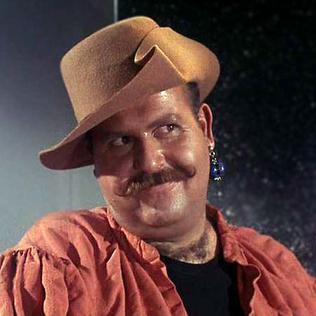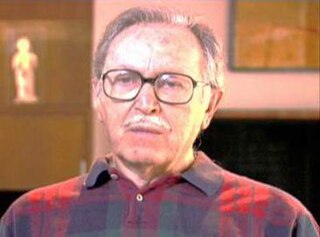Related Research Articles
"The City on the Edge of Forever" is the twenty-eighth and penultimate episode of the first season of the American science fiction television series Star Trek. Written by Harlan Ellison, contributors and/or editors to the script included Steven W. Carabatsos, D. C. Fontana and Gene L. Coon. Gene Roddenberry made the final re-write. The episode was directed by Joseph Pevney and first aired on NBC on April 6, 1967, with a repeat broadcast on August 31, 1967.
"Encounter at Farpoint" is the pilot episode and series premiere of the American science fiction television series Star Trek: The Next Generation, which premiered in syndication on September 28, 1987. It was written by D. C. Fontana and Gene Roddenberry and directed by Corey Allen. Roddenberry was the creator of Star Trek, and Fontana was a writer on the original series. It was originally aired as a two-hour TV movie, and subsequent reruns typically split the episode into two parts.

"Where No Man Has Gone Before" is the third episode of the first season of the American science-fiction television series Star Trek. Written by Samuel A. Peeples and directed by James Goldstone, it first aired on September 22, 1966.

Christine Chapel is a fictional character who appears in all three seasons of the American science fiction television series Star Trek: The Original Series, as well as Star Trek: The Animated Series and the films Star Trek: The Motion Picture and Star Trek IV: The Voyage Home. Portrayed by Majel Barrett, she was the ship's nurse on board the Starfleet starship USS Enterprise. A younger version of Chapel appears in the 2022 series Star Trek: Strange New Worlds, portrayed by Jess Bush.

Janice Rand is a fictional character in the American science fiction television series Star Trek: The Original Series during its first season, as well as three of the Star Trek films. She is the Captain's yeoman on board the USS Enterprise (NCC-1701), and first appeared in the episode "The Man Trap". She had significant roles in the episodes "The Enemy Within", where she fights off an evil version of Captain James T. Kirk; "Charlie X" where a young man with god-like powers falls in love with her; and "Miri" where she is infected with a deadly disease while on an away mission and is kidnapped by jealous children.

Una Chin-Riley, commonly and originally only known as Number One, is a fictional character in the science-fiction franchise Star Trek. She is Christopher Pike's second-in-command during his captaincy of the starship Enterprise.
"The Man Trap" is the first episode of season one of the American science fiction television series Star Trek. Written by George Clayton Johnson and directed by Marc Daniels, it featured design work by Wah Chang and first aired in the United States on September 8, 1966.

"Mudd's Women" is the sixth episode of the first season of the American science fiction television series Star Trek. Written by Stephen Kandel, based on a story by Gene Roddenberry, and directed by Harvey Hart, it first aired on October 13, 1966.

Dorothy Catherine Fontana was an American television script writer and story editor, best known for her work on the original Star Trek series and several Western television series.
"The Empath" is the twelfth episode of the third season of the American science fiction television series Star Trek. Written by Joyce Muskat and directed by John Erman, it was first broadcast on December 6, 1968.
“Let That Be Your Last Battlefield” is the fifteenth episode of the third season of the original American science fiction television show Star Trek. Written by Oliver Crawford and directed by Jud Taylor, it was first broadcast January 10, 1969.
The "Theme from Star Trek" is an instrumental musical piece composed by Alexander Courage for Star Trek, the science fiction television series created by Gene Roddenberry and originally aired between September 8, 1966, and June 3, 1969.

Robert Harris "Bob" Justman was an American television producer, director, and production manager. He worked on many American TV series including Lassie, The Life of Riley, Adventures of Superman, The Outer Limits, Star Trek, Mission: Impossible, Search, and Then Came Bronson.
Jean Lisette Aroeste was a former University of California, Los Angeles librarian and Star Trek fan who became one of four writers with no prior television writing credits to sell scripts to the program.
Norway Corporation, also called Norway Productions, is a motion picture and television production company established by Gene Roddenberry. Norway Corporation is best known for having been the production company that brought Star Trek: The Original Series to television on the NBC network in association with Desilu Studios, which later became part of Paramount Television.

The first season of the American television science fiction series Star Trek: The Next Generation commenced airing in broadcast syndication in the United States on September 28, 1987, and concluded on May 16, 1988, after 26 episodes were broadcast. Set in the 24th century, the series follows the adventures of the crew of the Starfleet starship Enterprise-D. It was the first live-action television series in the franchise to be broadcast since Star Trek: The Original Series was cancelled in 1969, and the first to feature all new characters. Paramount Television eventually sought the advice of the creator of Star Trek, Gene Roddenberry, who set about creating the new show with mostly former The Original Series staff members. An entirely new cast were sought, which concerned some members of The Original Series crew, as Roddenberry did not want to re-tread the same steps as he had in the first series to the extent that well-known Star Trek aliens such as Vulcans, Klingons and Romulans were banned at first.
Lincoln Enterprises, formerly Star Trek Enterprises, was a mail-order company set up by Bjo Trimble and Gene Roddenberry to sell merchandise related to the American science fiction television series Star Trek. It was known for selling official scripts and film cells directly from Desilu Productions during the run of the series. It later expanded into general Star Trek merchandise under Majel Barrett, and has since subsumed into Roddenberry.com.

The development of Spock, a fictional character first introduced in the American science fiction television series Star Trek, began prior to the start of the series. The first known mention of Spock was in a discussion between Gene Roddenberry and Gary Lockwood, where the latter suggested Leonard Nimoy for the role. Roddenberry agreed with the suggestion, and Nimoy became the first choice actor for the part. However, Roddenberry was required to audition other actors for the role. It was offered to both DeForest Kelley and Martin Landau before Nimoy. Nimoy disliked the prosthetic ears he was required to wear, and there were concerns from the studio that they made him appear satanic. Roddenberry fought to keep the character in the second pilot, "Where No Man Has Gone Before" after the rest of the main cast was dropped from the initial pilot, "The Cage".
References
- ↑ STAR TREK: THE ORIGINAL SERIES--SEASON 3 (Skybox, 1999)--Behind-The-Scenes insert #B125
- ↑ Dave Eversole Story outline of "The Empath" Archived 2008-01-03 at the Wayback Machine Orion Press/Fast Copy website
- ↑ Herbert Solow and Robert H. Justman, Inside Star Trek: The Real Story, Pocket Books, 1996, p.404